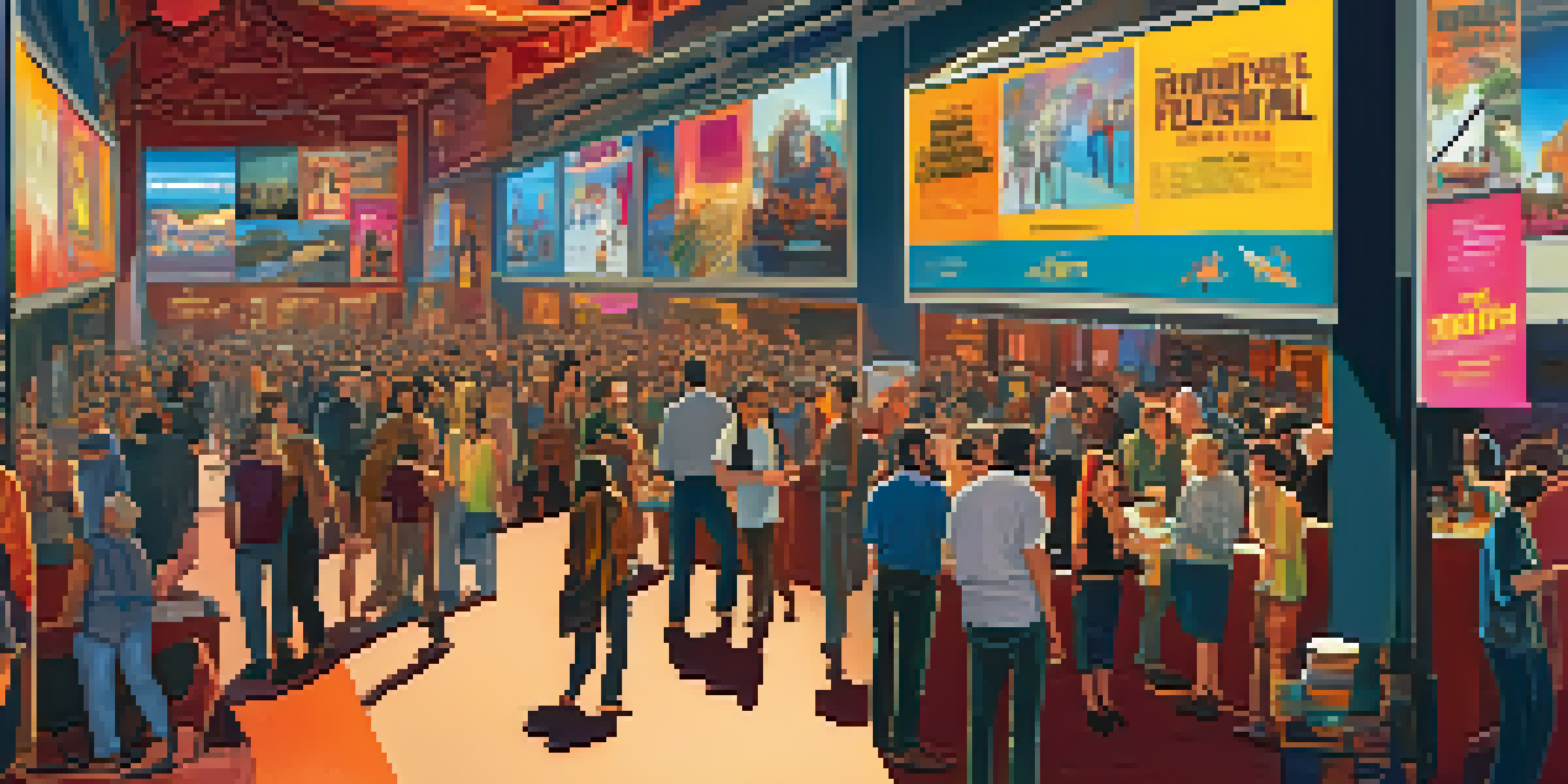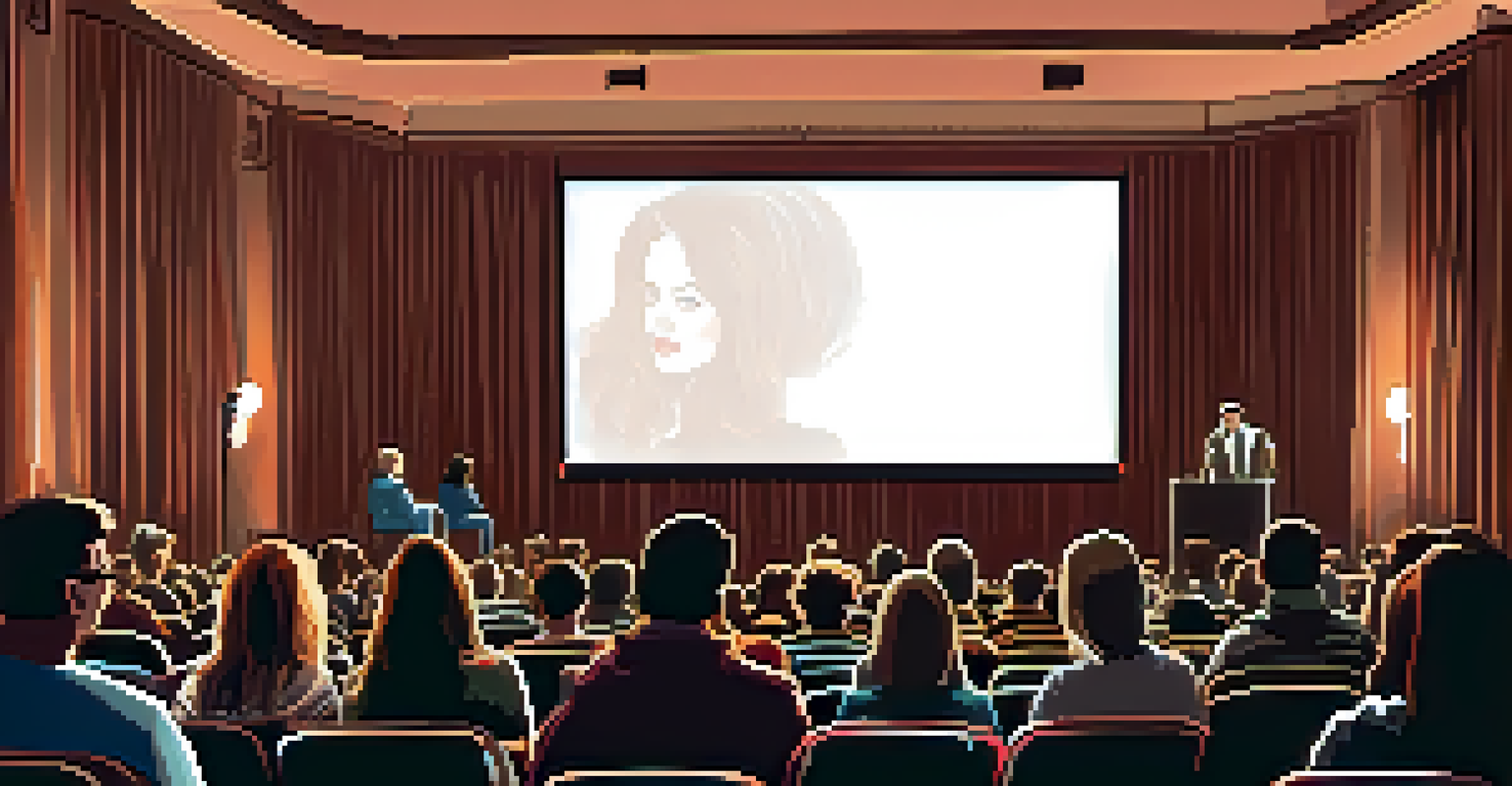How Film Festivals Uncover Hidden Gems in Cinema

Film Festivals: A Gateway to Unique Cinematic Experiences
Film festivals serve as a vibrant platform for filmmakers to showcase their work. These events often feature independent films that might not get the same attention as blockbuster movies. By providing a space for creativity and innovation, festivals allow fresh voices to share their stories with the world.
Film is a powerful means of communication and can create empathy and understanding among diverse cultures.
Attending a film festival can feel like a treasure hunt, where every screening holds the potential for a delightful surprise. Audiences often discover films that resonate deeply with them, sparking conversations and connections. This sense of shared experience is what makes film festivals so special.
Moreover, festivals often embrace diverse genres and narratives, ensuring that audiences encounter a variety of perspectives. This diversity not only enriches the cinematic landscape but also encourages filmmakers to push boundaries and explore new themes. In essence, festivals are a celebration of the art of storytelling.
Spotlighting Emerging Filmmakers and Unique Voices
One of the most exciting aspects of film festivals is the opportunity to discover emerging filmmakers. Many talented directors and writers use festivals as a launchpad for their careers, presenting their first or second feature films. This exposure can lead to critical acclaim, distribution deals, and opportunities to work on larger projects.

Festivals often prioritize diverse voices that reflect the complexities of our world. By showcasing films from underrepresented communities, they highlight stories that might otherwise go untold. This commitment to inclusivity not only enriches the audience's experience but also fosters a more equitable film industry.
Film Festivals Showcase Unique Stories
Film festivals provide a platform for independent filmmakers to present diverse narratives that might otherwise go unnoticed.
By supporting new talent, film festivals play a crucial role in shaping the future of cinema. They provide a platform for innovative storytelling and encourage filmmakers to challenge societal norms. In doing so, festivals contribute to a vibrant cultural dialogue that resonates with audiences everywhere.
Creating Buzz: The Power of Premiere Screenings
Premiere screenings at film festivals often generate significant buzz, helping films gain traction in the industry. When a film premieres to a receptive audience, it can create a ripple effect, leading to increased interest from distributors and media outlets. This initial excitement can be a game changer for independent films, propelling them into the spotlight.
The magic of cinema is that it can take you anywhere, and film festivals are the gateways to these extraordinary journeys.
Audience reactions are crucial during these premiere events, as they provide filmmakers with immediate feedback. This interaction can be invaluable, helping directors understand what resonates with viewers and what might need refinement. The energy in the room during a premiere can also create lasting memories for both filmmakers and attendees.
Furthermore, the media coverage surrounding premieres amplifies the film's visibility. Journalists and critics often attend these events, eager to share their insights and reviews. This exposure can lead to a film gaining a dedicated following even before it officially releases.
Cultivating Community: The Social Aspect of Film Festivals
Film festivals are as much about community as they are about cinema. They bring together filmmakers, critics, and film lovers, creating a unique environment for networking and collaboration. This sense of community fosters relationships that can last a lifetime, encouraging filmmakers to share resources and support each other's projects.
Attendees often leave festivals with new friendships and connections, bonded by their shared love of film. These interactions can lead to exciting projects and collaborations, enhancing the overall creative landscape. The informal atmosphere of festivals encourages open dialogue and discussion, sparking inspiration among participants.
Emerging Filmmakers Gain Exposure
These events spotlight new talent, helping filmmakers launch their careers and promote innovative storytelling.
Moreover, festivals frequently host panels and workshops, providing opportunities for learning and growth. These events allow filmmakers to share their experiences and insights, benefiting aspiring directors and writers. In this way, film festivals cultivate a thriving ecosystem of creativity and support.
The International Appeal: Discovering Global Cinema
Film festivals often showcase international films, offering audiences a chance to explore diverse cultures and stories. This global perspective enriches the cinematic experience and broadens viewers' horizons. By presenting films from different countries, festivals allow audiences to connect with narratives they might not encounter otherwise.
Attending an international film can be like embarking on a journey without ever leaving your seat. Each film provides a window into another culture, showcasing unique traditions, struggles, and triumphs. This cultural exchange enhances empathy and understanding among viewers, making cinema a powerful tool for connection.
Furthermore, international films often tackle universal themes, making them relatable regardless of cultural background. Festivals highlight these connections, proving that stories can transcend borders. This celebration of global cinema encourages a more inclusive and holistic view of the world.
Audience Engagement: The Interactive Experience of Festivals
Film festivals offer a more interactive experience than traditional movie theaters. Many festivals incorporate Q&A sessions with filmmakers, allowing audiences to engage directly with the creators. This connection deepens the viewing experience, as attendees can ask questions and gain insight into the filmmaking process.
The interactive nature of festivals fosters a sense of participation among audiences. Viewers feel like they're part of a larger conversation about film, art, and culture. This engagement can lead to a more meaningful appreciation of the films being presented.
Interactive Experience Engages Audiences
Festivals foster direct interaction between filmmakers and audiences, enhancing the overall film appreciation experience.
Additionally, some festivals host themed events, parties, and networking opportunities that encourage social interaction. These gatherings create a lively atmosphere, where attendees can discuss films, share opinions, and even forge new friendships. This sense of community enhances the overall festival experience.
The Role of Awards in Recognizing Hidden Talent
Awards presented at film festivals can significantly elevate a film's profile. Winning or even being nominated for a prestigious award can lead to increased visibility and funding opportunities for filmmakers. This recognition can help propel hidden gems into the mainstream, allowing them to reach wider audiences.
Moreover, awards serve as a validation of a filmmaker's hard work and creativity. They can be a powerful motivator for emerging talent, encouraging them to continue telling unique stories. The prestige associated with festival awards can also attract attention from distributors and production companies, further supporting the filmmaker's career.

Festivals like Sundance, Cannes, and Toronto have a reputation for launching successful careers for many filmmakers. Their award ceremonies celebrate innovative storytelling and serve as a reminder of the importance of recognizing diverse voices in cinema. This acknowledgment can make all the difference in a filmmaker's journey.